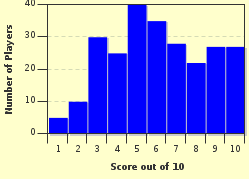Quiz Answer Key and Fun Facts
1. It's hard to read this dramatic tale without wondering what Jonah's life is like when he isn't in a huge fight with God. What personal detail of Jonah's life does the Book of Jonah reveal about its protagonist?
2. As the Book of Jonah opens, the first thing God says to Jonah is (1:2) "Go at once to Nineveh, that great city, and proclaim judgment upon it, for their wickedness has come before Me." What's the first thing Jonah says to God after receiving this prophecy?
3. When God commands Jonah to go to Nineveh, Jonah initially does something no other prophet does after receiving a divine mission. What does Jonah do?
4. Jonah's ship to Tarshish is caught up in a violent storm of divine origin, and Jonah is ultimately hurled overboard by the frightened sailors. Whom do the sailors blame for Jonah's (apparent) death?
5. Jonah is saved from drowning when God causes a big fish to swallow the prophet. While in the belly of the fish, Jonah composes a prayer to God. Which of the following is NOT mentioned in Jonah's prayer?
6. After Jonah is spit out onto dry land by the fish, he obeys God's second summons to Nineveh and arrives in the city with a dire message. "40 days more, and Nineveh shall be overthrown," Jonah proclaims (3:4). How do the people of Nineveh react to this grim announcement?
7. It's unusual, in the Hebrew Bible, for an Israelite prophet to receive a message solely meant for a gentile community. But what makes Nineveh an especially strange city for Jonah to be sent to save?
8. It's not until the fourth chapter of the Book of Jonah that we finally learn why Jonah initially ran away from God. What was Jonah's reason?
9. To teach Jonah a lesson, God "provides" three things in nature. What are they?
10. The first reason God gives for saving the people of Nineveh is that God created them and cares about them. What is the other reason God gives for sparing Nineveh?
Source: Author
jwerth
This quiz was reviewed by FunTrivia editor
CellarDoor before going online.
Any errors found in FunTrivia content are routinely corrected through our feedback system.

